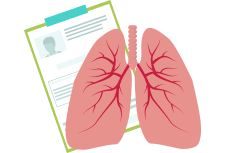What is long COVID?
Long COVID is a term to describe symptoms that continue for more than four weeks. It encompasses symptoms such as breathlessness, fatigue, chest pain, and brain fog amongst others.
How common is long COVID?
The Office for National Statistics (ONS) estimates that over a million people in the UK were reporting symptoms associated with long COVID at the beginning of March 2021, with over two-thirds of these individuals having had (or suspecting they had) COVID-19 at least 12 weeks earlier. An estimated 674,000 people reported that their symptoms have negatively impacted on their ability to undertake their day-to-day activities. People who tested positive for COVID-19 are around eight times more likely to suffer prolonged symptoms than observed in the general population. That’s a lot of people!
How is long COVID diagnosed?
The first thing is trying to establish whether you’ve actually had COVID, as long COVID symptoms can be vague and can potentially be caused by a myriad of other non-COVID disorders. I try to confirm that you’ve had COVID in 3 ways:-
- A positive COVID swab (called a PCR test).
- A positive COVID antibody blood test.
- Clinical symptoms.
It possible that you never had a swab or that your antibody is negative. This doesn’t necessarily mean you haven’t had COVID, just that we can’t prove it. However, symptoms may suggest you have had COVID, especially fever, cough, breathlessness, change in your taste or smell (anosmia) and fatigue amongst others.
Why see a specialist for long COVID?
It’s important that you see a specialist with experience in the investigation and management of long COVID. Why is this important? The majority of long COVID patients I look after have breathlessness, chest pain and/or fatigue. These symptoms are important because they may be caused by a wide variety of disorders and some may relate to any pre-existing lung/heart disease. I’m fortunate to work in an expert multidisciplinary team who can help with the non-lung long COVID things e.g. neurologist (brain), dermatologist (skin), gastroenterologist (digestion) and ENT (ear, nose and throat). Whatever your symptoms, I can help you or get you rapidly to the correct specialist to help you back to your normal health as soon as possible.

COVID and the lungs
Over the last year I have helped many patients with long COVID just like you. We start off with a consultation that may be virtual e.g. via Zoom or I can see you face-to-face if required (with the appropriate PPE). I listen to your history, ask questions and examine your chest if face-to-face. We can then proceed to investigations that typically include: blood tests; breathing tests; and either a chest x-ray or CT scan of your chest. This helps to build a picture of the structure and function of your lungs so we know exactly what we are dealing with. It might be necessary to have a second round of tests that may include an exercise test to check on your heart and lung fitness, Plus a referral to a cardiologist for an ECG (heart tracing) and echocardiogram (ultrasound scan of heart).
Quite often tests can come back as relatively normal but the exercise test may reveal that you have become deconditioned – basically you have become out of shape and lost your fitness level. Fear not, I have just the team to help with this. I work closely with expert respiratory physiotherapists who can assess for any breathing pattern disorders (these are very common) and help to rehabilitate your lungs. Imagine you had a frozen shoulder, you’d go to see a shoulder physiotherapist. This is why it’s so important to see the right type of physiotherapist.
COVID can affect your breathing/chest in a number of ways:
- Persistent inflammation/infection of your lungs.
- Blood clots on your lungs (PE – pulmonary embolism).
- Scarring of your lungs (fibrosis).
All of these complications can be confirmed/excluded on a test called CTPA – a CT scan of your chest with an injection of dye (contrast). I can organise this for you, if required, typically either the same or next day.
For cardiac issues, I can arrange for you to see a cardiologist with experience of long COVID. Again, it’s so important to see the correct specialist.
What’s the outlook for my long COVID?
It’s good! The vast majority of people improve with this approach to managing long COVID. I can’t emphasise enough the importance of accurate diagnosis from the outset, including the management of any pre-existing lung or heart problems. Again, this is why it’s so important to see an expert in long COVID like me, who can:
- See and assess you rapidly (usually within 24 hours if you wish).
- Listen to you and understand your problem(s).
- Arrange speedy investigations and refer to additional specialists if required.
- Treat you rapidly and help get you back running, cycling, walking the dog, or whatever it is you want to achieve.
If you want to see what other patients think about my approach and treatment, click here to read their feedback.
So, what are you waiting for? Give me a call or send me an email and let’s kick your long COVID into touch!


